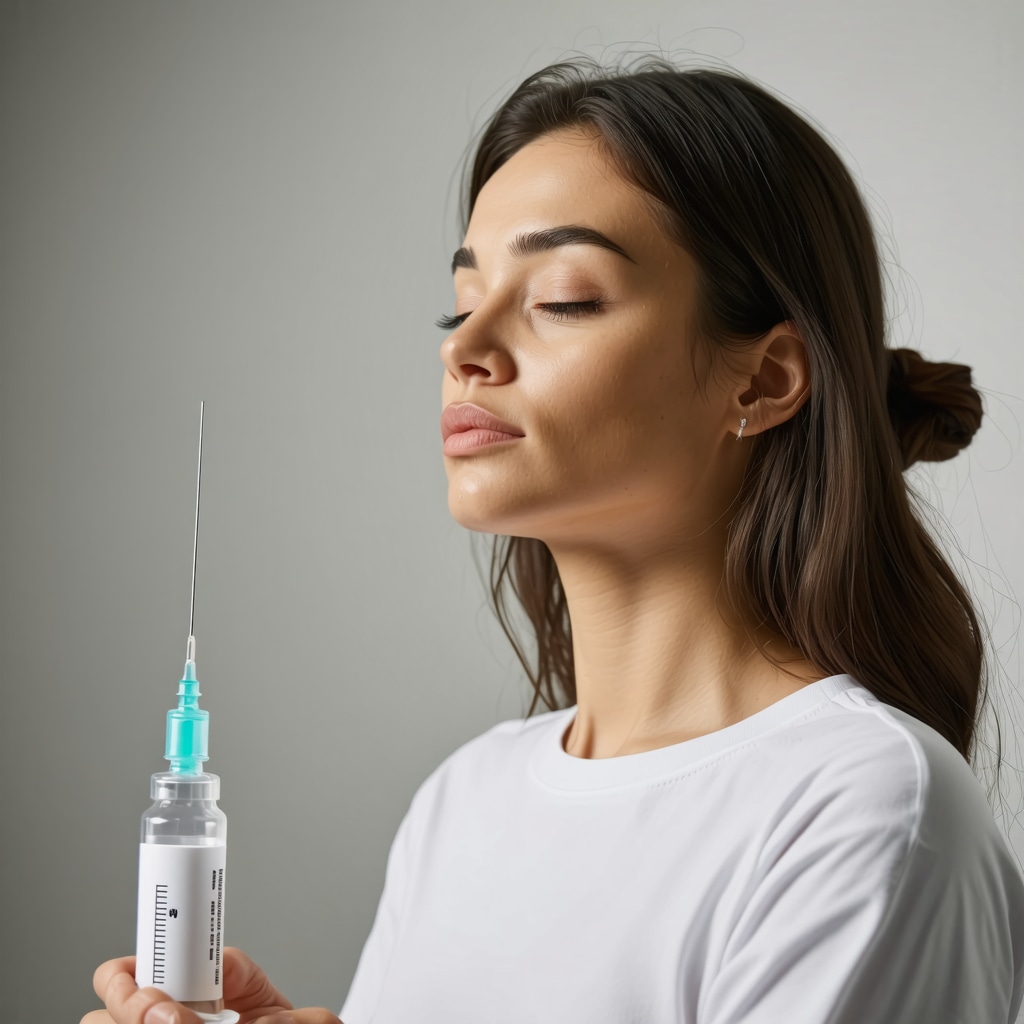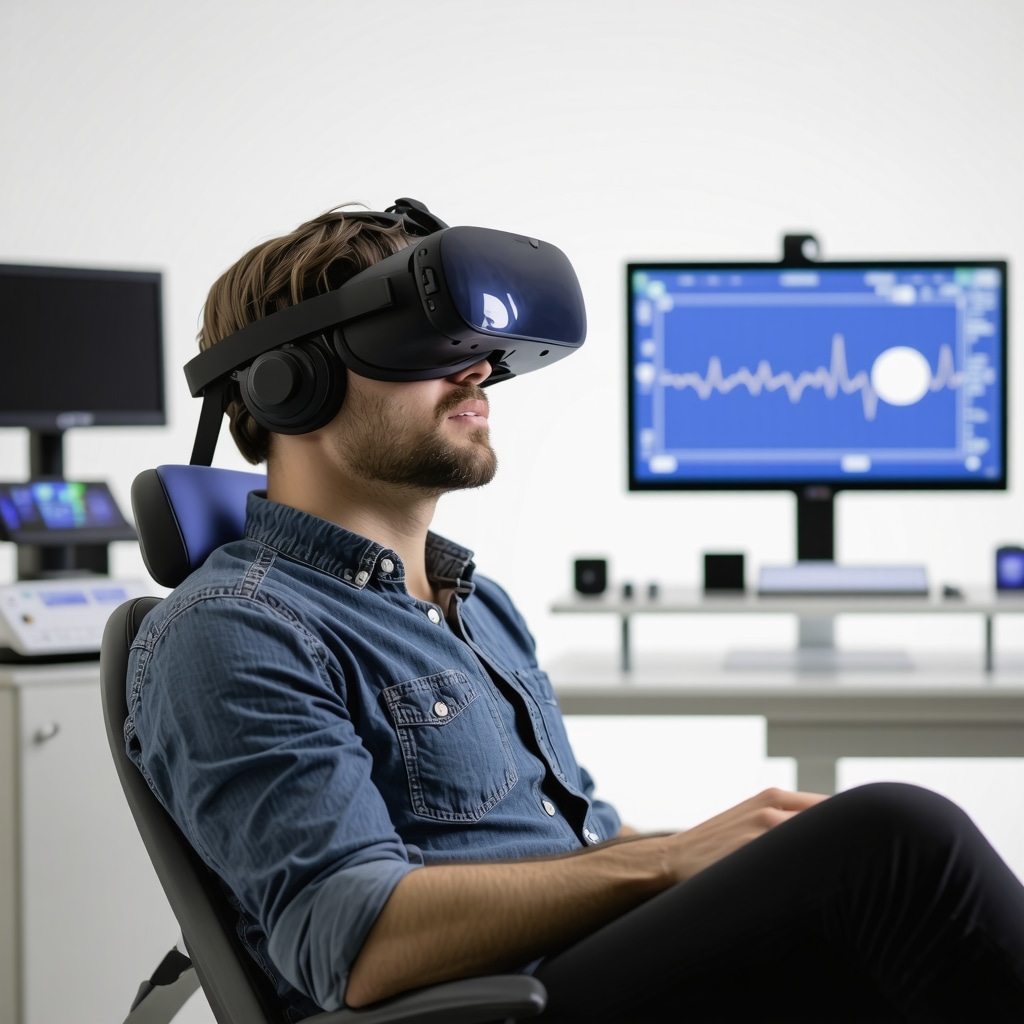Staring Down the Needle: A Tale as Old as Time
Let’s be honest—there’s something about the sight of a tiny needle that turns even the bravest among us into trembling messes. When it comes to prescription injection weight loss treatments, this needle anxiety can be a real hurdle. But fear not! Beyond the clinical jargon and sterile vials, there’s a human story here about overcoming fears and embracing health transformations.
Why Do Needles Freak Us Out So Much?
Needle anxiety isn’t just about sharp objects; it’s a cocktail of past experiences, fear of pain, and a dash of the unknown. For many embarking on injectable weight loss journeys, this anxiety can actually sabotage progress. Understanding this fear is the first step toward mastering it.
Could a Little Mindset Shift Be the Secret Weapon Against Injection Anxiety?
Imagine flipping the script—viewing each injection not as a painful ordeal but as a tiny victory in your weight loss saga. Techniques like deep breathing, visualization, and even progressive muscle relaxation can dramatically reduce the dread. As Dr. Emily Deans, a psychiatrist with expertise in anxiety, notes, “Reframing the injection experience can help patients regain control and reduce anticipatory stress.”
Practical Tips to Tame the Needle Beast
First up, choose the right needle size and injection sites—it’s more than just a poke in the arm. The needle selection guide on eWeightLossTips offers excellent advice tailored to comfort and effectiveness. Also, practicing sterile techniques and warming the medication to room temperature can minimize discomfort and reassure even the most nervous patients.
Don’t underestimate the power of distraction! Listening to your favorite podcast or chatting with a friend during injection can take your mind off the needle. And remember, regular consultation with your healthcare provider is key; they can offer personalized strategies and encouragement to ease your fears.
Injectable Weight Loss: The Science Behind the Scenes
Understanding the remarkable science of GLP-1 receptor agonists and other injectable medications can empower you. These drugs work by regulating appetite and glucose metabolism, paving a smoother path to weight loss. For those curious, the science behind injectable weight loss is fascinating and can serve as motivation when the needle looms large.
Care to Share Your Story?
If you’ve wrestled with injection anxiety or found clever hacks to make your weight loss injections less intimidating, let’s hear it! Drop a comment or share your insights to help others on this journey. Because sometimes, the best remedy for fear is knowing you’re not alone.
For further expert-backed tips on managing injection anxiety and maximizing your weight loss journey, check out this comprehensive guide.
And if you want to dive deeper into the psychological aspects of needle phobia, the article “Managing Needle Phobia: Strategies for Patients” published by the American Psychological Association offers invaluable insights (source).
Beyond Basics: Psychological Tools to Overcome Injection Anxiety
While practical tips like needle selection and site rotation are vital, diving deeper into psychological strategies can transform your injection experience. Cognitive-behavioral techniques, such as exposure therapy and mindfulness meditation, have been shown to reduce phobic reactions by rewiring your brain’s response to needles. By gradually and systematically facing needle-related stimuli in a controlled manner, patients can desensitize their anxiety triggers, making the act of injection less daunting over time.
Mindfulness practices, focusing on present-moment awareness without judgment, help reduce anticipatory stress. These techniques encourage noticing physical sensations and thoughts without spiraling into fear, which can be particularly effective before and during injections. For those interested, resources like doctor-approved weight loss advice on overcoming injection anxiety provide actionable guidance.
The Role of Support Systems in Managing Injection Fear
Injection anxiety doesn’t exist in a vacuum. Social and emotional support dramatically influence patient outcomes. Engaging with supportive communities—whether in-person groups or online forums—can normalize fears and foster shared coping strategies. Friends or family members can assist by providing accompaniment during injections or by simply being a reassuring presence.
Healthcare providers also play a pivotal role. Open communication about fears, side effects, and concerns allows providers to tailor treatment plans, adjust dosing schedules, or even recommend adjunct therapies for anxiety. This collaborative approach enhances adherence and ultimately weight loss success.
How Can Combining Behavioral Techniques with Medical Guidance Maximize Your Injection Confidence?
Integrating psychological methods such as relaxation training and cognitive restructuring alongside medical supervision forms a comprehensive approach to conquering needle anxiety. This synergy not only reduces fear but also boosts patient empowerment, leading to more consistent medication use and better outcomes. For instance, a recent study published in the Journal of Clinical Psychology highlights how combining exposure therapy with patient education significantly improved injection adherence and reduced anxiety symptoms (source).
Moreover, understanding the physiological basis of anxiety—such as the role of the autonomic nervous system in triggering fight-or-flight responses—can encourage patients to adopt breathing exercises or biofeedback techniques before injections. These not only calm the nervous system but also create a sense of control over the injection process.
Embracing Technology: Digital Tools to Ease Injection Anxiety
Modern technology offers exciting avenues to alleviate needle fears. Mobile apps designed for anxiety management provide guided meditations, distraction games, and progress tracking for injection routines. Virtual reality (VR) exposure therapy is another emerging tool, allowing patients to simulate injections in a safe environment to reduce fear responses gradually.
Tracking your injection progress with digital journals or apps can also help identify patterns in anxiety or side effects, enabling timely interventions. For detailed advice on staying motivated and tracking your progress, see our weekly injection weight loss guides.
Have you tried any digital aids or psychological techniques to manage your injection anxiety? Share your experiences in the comments below—your insights could be the encouragement someone else needs.

Neuroscience Meets Injection Anxiety: Unlocking Brain Pathways for Fear Reduction
Delving deeper into the neurobiological mechanisms behind needle phobia reveals fascinating insights that can revolutionize how we approach injection anxiety in weight loss treatments. The amygdala, a brain region central to processing fear, often becomes hyperactive during needle anticipation, triggering intense physiological reactions like increased heart rate and sweating. However, neuroplasticity—the brain’s remarkable ability to rewire itself—offers hope. Through repeated, controlled exposure and cognitive-behavioral interventions, patients can modulate amygdala responsiveness, effectively dampening the fear response over time.
Recent functional MRI studies illustrate how mindfulness and relaxation techniques activate the prefrontal cortex, which exerts top-down control over the amygdala, thus reducing anxiety levels during injections. This neuroscientific perspective underscores why integrating psychological therapies with pharmacological weight loss treatments yields superior adherence and outcomes.
What Are the Latest Evidence-Based Psychological Approaches to Mitigate Injection Anxiety in Weight Loss Patients?
Emerging research highlights several sophisticated interventions tailored specifically for injection anxiety. Acceptance and Commitment Therapy (ACT), for example, encourages patients to acknowledge their fears non-judgmentally while committing to health goals, reframing injections as aligned with personal values rather than threats. Likewise, Eye Movement Desensitization and Reprocessing (EMDR), traditionally used for trauma, has shown promise in reducing phobic responses by reprocessing distressing memories associated with needles.
Incorporating these therapies into routine care requires collaboration between psychologists and medical providers, ensuring a personalized approach that addresses both the physiological and psychological facets of injection fear.
Precision Medicine: Customizing Injection Protocols to Minimize Discomfort and Anxiety
The era of precision medicine extends beyond genetics—with injection protocols now being tailored to individual patient profiles, including pain sensitivity, anxiety levels, and lifestyle factors. For instance, adjusting injection frequency, volume, and site based on patient feedback can drastically reduce discomfort, thereby diminishing anticipatory anxiety. Moreover, novel needle technologies employing ultra-thin, coated needles minimize tissue trauma, making injections nearly imperceptible.
Healthcare providers can also utilize anxiety screening tools to identify patients at higher risk of needle phobia, enabling early intervention. This proactive stance not only improves patient comfort but also enhances long-term treatment adherence, pivotal for sustained weight loss success.
Digital Innovations: Harnessing Virtual Reality and Biofeedback for Real-Time Anxiety Management
Virtual reality (VR) therapy is rapidly gaining traction as a cutting-edge solution for injection anxiety. By immersing patients in controlled virtual environments that simulate the injection process, VR allows gradual desensitization while providing engaging distraction. Coupled with real-time biofeedback measuring heart rate variability and skin conductance, patients receive immediate insights into their physiological stress responses, empowering them to apply relaxation techniques effectively.
Studies published in Frontiers in Psychology illustrate significant reductions in injection-related distress following VR-assisted exposure therapy protocols (source). These technological advances herald a new paradigm where psychological empowerment and innovative tools converge to make injection-based weight loss treatments more accessible and tolerable.

Integrating Multidisciplinary Approaches: A Holistic Model for Injection Anxiety Management
Addressing injection anxiety demands a holistic framework that synthesizes medical, psychological, and technological strategies. Multidisciplinary teams incorporating endocrinologists, psychologists, and digital health specialists can collaboratively develop individualized care plans. Such plans might combine pharmacotherapy with cognitive-behavioral sessions, VR exposure, and tailored injection schedules, ensuring both physical and emotional needs are met.
Patients benefit not only from reduced anxiety but also from enhanced self-efficacy and motivation, critical components in the weight loss journey. This comprehensive approach aligns with contemporary models of patient-centered care, emphasizing empowerment and sustained behavioral change.
For clinicians and patients eager to explore these integrative strategies further, specialized workshops and continuing education programs are emerging as valuable resources to bridge the gap between theory and practice.
Decoding the Subtle Nuances of Injection Anxiety: Beyond Fear and Into Mastery
While many recognize injection anxiety as a simple fear of needles, the phenomenon extends deeper into behavioral conditioning and neurobiological pathways. This intricate web of psychological and physiological responses often traps patients in a cycle of avoidance and stress, which can undermine the efficacy of prescription injection weight loss treatments. Exploring these subtleties unveils opportunities for transformative mastery that elevate patient adherence and well-being.
How Can Precision Behavioral Interventions Tailored to Individual Anxiety Profiles Optimize Injection Outcomes?
Recent advances advocate for customizing behavioral interventions based on specific anxiety phenotypes—ranging from mild anticipatory discomfort to severe phobic reactions. For example, integrating biofeedback-assisted relaxation with cognitive restructuring can recalibrate autonomic hyperarousal in patients exhibiting somatic anxiety symptoms. Meanwhile, patients with entrenched avoidance behaviors benefit from graded exposure therapy coupled with motivational interviewing to reinforce health goals. A seminal study in the Journal of Anxiety Disorders emphasizes that such personalized psychological frameworks significantly enhance injection adherence and reduce dropout rates (source).
Healthcare providers should consider comprehensive anxiety assessments as part of initial treatment planning, enabling tailored strategies that align with individual psychological profiles. This approach synergizes well with medical supervision, fostering an environment where patients feel supported both physically and emotionally.
Integrating Nutritional Psychology to Complement Injectable Weight Loss Therapies
The interplay between nutrition, mood, and anxiety presents an often-overlooked dimension in weight loss injections. Nutritional psychiatry posits that dietary patterns rich in omega-3 fatty acids, probiotics, and micronutrients can modulate neuroinflammation and neurotransmitter synthesis, thereby attenuating anxiety symptoms. Incorporating these principles alongside injectable regimens can create a holistic therapeutic milieu that mitigates injection-related anxiety.
Patients are encouraged to explore evidence-based dietary adjustments as adjuncts, supported by resources like the science-based strategies for maximizing Wegovy results. This integrative approach not only supports mental resilience but also potentiates metabolic outcomes.
Emerging Pharmacological Adjuncts: Can Anxiolytics Support Injection Tolerance Safely?
For some patients, the severity of injection anxiety may warrant short-term pharmacological support. Selective serotonin reuptake inhibitors (SSRIs) or low-dose benzodiazepines prescribed judiciously can reduce anticipatory anxiety without compromising the weight loss medication’s efficacy. However, this approach necessitates close monitoring to avoid dependency and adverse interactions.
Collaboration between prescribing clinicians and mental health specialists ensures safe integration of anxiolytics within the broader weight loss plan. Patients interested in exploring this option should consult their healthcare providers to assess suitability and risk.
Harnessing Peer Support Networks: Amplifying Confidence Through Shared Experiences
The power of peer-led interventions cannot be overstated. Online communities and local support groups dedicated to prescription injection weight loss provide platforms for sharing coping strategies, emotional validation, and practical tips. These networks foster empowerment and normalize injection anxiety, diminishing stigma and isolation.
Engaging regularly with such communities complements clinical care and psychological interventions, creating a robust support ecosystem. For inspiration and guidance, consider joining forums linked through weekly injection weight loss guides focused on motivation and community support.
Ready to Elevate Your Injection Confidence? Share Your Journey and Discover New Strategies!
Your experience matters—whether you’ve conquered needle fears or are still navigating them. Join the conversation by commenting below, exchanging insights, and exploring expert medical guidance to master injection weight loss. Together, we can transform fear into fuel for success.

Expert Insights & Advanced Considerations
Precision Behavioral Profiling Enhances Injection Adherence
Tailoring behavioral interventions to individual anxiety profiles—ranging from mild unease to severe phobia—enables more effective management of injection anxiety. Integrating biofeedback-assisted relaxation with cognitive restructuring recalibrates autonomic responses, while graded exposure therapies combined with motivational interviewing reinforce commitment to treatment goals. This nuanced approach significantly improves adherence rates and patient outcomes, as evidenced by recent psychological research (source).
Neuroplasticity-Based Therapies Offer Lasting Anxiety Reduction
Emerging neuroscientific findings reveal that repeated controlled exposure paired with mindfulness activates prefrontal regulatory circuits, diminishing amygdala-driven fear responses. This neurobiological insight supports the use of cognitive-behavioral interventions and acceptance-based therapies (ACT), which empower patients to reframe injections as aligned with personal health values, fostering sustainable anxiety reduction and enhanced medication compliance.
Technological Innovations Transform Injection Experiences
Virtual reality (VR) exposure therapy combined with real-time biofeedback is revolutionizing how patients confront needle anxiety. Immersive simulations provide safe environments for gradual desensitization, while physiological monitoring offers immediate feedback facilitating relaxation techniques. This cutting-edge synergy expands therapeutic options beyond traditional methods, improving tolerance and engagement with injectable weight loss treatments.
Multidisciplinary Care Models Optimize Patient Outcomes
Holistic management integrating endocrinologists, psychologists, and digital health experts ensures individualized, comprehensive care plans. Combining pharmacotherapy with tailored psychological support and technology-assisted interventions addresses both physical discomfort and emotional barriers, enhancing self-efficacy and long-term success in prescription injection weight loss programs.
Integrating Nutritional Psychiatry Enhances Anxiety and Weight Loss Synergy
Dietary strategies targeting neuroinflammation and neurotransmitter balance—such as omega-3 fatty acid supplementation and probiotic-rich foods—complement injection therapies by mitigating anxiety symptoms. This integrative approach aligns mental health with metabolic goals, supporting overall well-being and potentiating weight loss efficacy (maximizing Wegovy results).
Curated Expert Resources
Journal of Anxiety Disorders: Offers cutting-edge studies on tailored psychological interventions for injection phobia and adherence improvement (source).
American Psychological Association – Managing Needle Phobia: Provides evidence-based strategies and clinical insights into phobia management (source).
Frontiers in Psychology – VR and Biofeedback in Anxiety: Details innovative uses of virtual reality and physiological monitoring in exposure therapy (source).
eWeightLossTips Expert Guides: Comprehensive resources on overcoming injection anxiety, managing side effects, and optimizing weight loss with injectable medications (overcoming injection anxiety, tracking progress).
Nutrition and Mental Health Literature: Explores the role of diet in modulating anxiety and supporting metabolic health to complement injectable treatments.
Final Expert Perspective
Injection anxiety remains a multifaceted obstacle in prescription injection weight loss that demands an integrative, patient-centered approach. Advancements in behavioral profiling, neuroplasticity-informed therapies, and digital innovations provide powerful tools to transform fear into mastery. When combined with multidisciplinary care and nutritional psychology, these strategies foster resilience, adherence, and optimized weight loss outcomes. Embracing this sophisticated landscape empowers patients and clinicians alike to navigate injectable therapies with confidence and sustained success.
For those committed to deepening your expertise and enhancing your injection journey, explore the expert medical guidance available at mastering prescription injection weight loss. Share your experiences and insights to contribute to this evolving conversation—because advancing together is the surest path to lasting health transformation.


I’ve definitely struggled with needle anxiety myself, and what resonated with me most in this post was the idea of reframing the injection as a tiny victory rather than a dreaded chore. Shifting that mindset made a huge difference during my weight loss journey. I also found that practicing deep breathing before and during the injection helped calm my nerves and reduced the anticipation stress. It’s interesting to see that there are even technology-based tools like VR therapy and biofeedback now being used to tackle this anxiety. I haven’t tried those yet, but it makes me curious if others have had success with these newer methods alongside more traditional psychological techniques? Additionally, the role of a support system really can’t be overstated; having a friend accompany me or simply chat with me during injections made the fear much more manageable. I wonder, for those who have faced severe injection phobia, how have you personalized your approach to get past that initial fear? Has anyone integrated nutritional changes or mindfulness practices in a way that noticeably lessened their injection anxiety? I’d love to hear about any creative or lesser-known strategies others have found helpful.
Reading this post really resonated with me because I used to dread injections until I started viewing each one as a small success step toward my health goals. The psychological shift from fear to triumph made all the difference. I also found that warming the medication and choosing a less sensitive site helped reduce discomfort. One approach I’ve tried that helped with my severe anxiety was listening to calming music or a favorite podcast during the injection—it distracted me and made the process feel less intimidating. I’ve also been curious about the newer tech-based methods like VR therapy; has anyone here tried those alongside traditional methods? Did they help expedite overcoming injection fears?
What I’d love to know from others is how they personalized their strategies—did you combine mindfulness, nutritional adjustments, or even engaging support systems? For those with intense needle phobia, I wonder if a gradual exposure plan coupled with professional guidance made a marked difference. Sharing these different approaches could really help those just starting out or struggling even more. It’s inspiring to see the array of tools available to help make this journey smoother for everyone.
This post really hits home for me, especially the part about psychological tools like exposure therapy and mindfulness. I’ve personally used deep breathing techniques to get through each injection, and I must say it makes a noticeable difference in calming the nervous system. I’m also intrigued by the emerging tech like virtual reality therapy; I haven’t tried it myself, but I’ve read about some patients finding it incredibly effective in desensitization. Combining these methods with support from loved ones really seems to create a powerful strategy—support system involvement is often underestimated.
From my experience, gradual exposure paired with professional guidance has helped me not only with needle anxiety but also in building overall confidence in managing treatment routines. Has anyone experimented with a structured exposure plan or even sought therapy specifically tailored for needle phobia? I’d love to hear about what worked well and any tips for practitioners who want to incorporate these psychological strategies into their patient care.